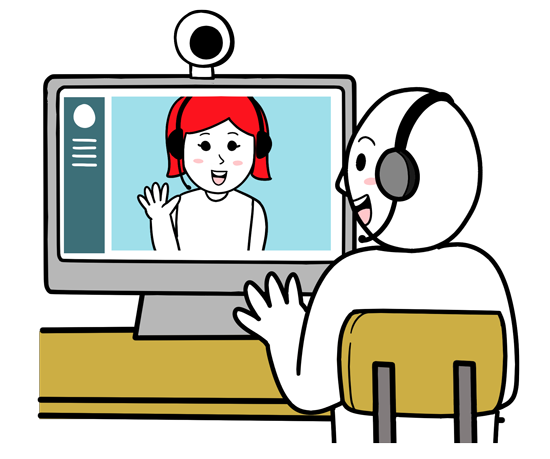This is lesson 8 (final lesson) of the English course.
Previous lessons: lesson 1 | lesson 2 | lesson 3 | lesson 4 | lesson 5 | lesson 6 | lesson 7
Earlier, I told you to do the followings to improve your spoken English:
- Listen to English conversations (a lot).
- Practice speaking with speaking lessons.
- Practice speaking by imitating native speakers.
These activities have one thing in common: you can do them alone without a partner.
Now you might be wondering, “Should I also practice speaking with a partner?”
In this lesson, you’ll discover the answer to that question.
First, I’ll tell you the pros and cons of practicing with a partner, and in the end, I’ll tell you whether you should practice with a partner or not.
Let’s begin.
The drawbacks of practicing with a partner
Many students believe that they need a partner in order to improve their speaking.
However, there are two HUGE problems with practicing with a partner.
Problem #1: it makes you stay in your little comfort zone.

Back when my spoken English was not good, whenever I had to talk to someone in English, I would speak very little because I was afraid that I might say something confusing, and I didn’t want to feel embarrassed.
I think you understand the feeling. When you’re afraid that the other person might not understand you, you only say simple stuff, and you avoid expressing ideas that are complicated.
But this is why your spoken English will NOT improve.
You see, to get better at speaking, you need to get out of your comfort zone. You need to practice something difficult.
For example:
- You need to try expressing an idea that’s difficult to explain.
- You need to talk about topics that you’re not familiar with.
- You need to use words or phrases you’ve never used before.
When you do these things, you’re going to make mistakes, you’re going say something confusing, and you’re going to sound stupid (sometimes). But this is the only way to improve your spoken English.
Unfortunately, when you talk to another person, you tend to stay in your comfort zone. This is bad because if you don’t challenge yourself, your spoken English will never improve.
This is why I like to practice alone. When I practice by myself, I can make a lot of mistakes without feeling embarrassed. If I say something stupid or confusing, it doesn’t matter because no one is listening.
I was able to improve way faster than most people because of this.
Problem #2: relying on a partner is a pain in the ass.
Today, it’s easy to find a speaking partner online. You can join a language exchange community, or you can reach out to people who left their Skype IDs on English forums.
Unfortunately, finding a partner is just the beginning. Once you begin to practice with your partner, you will run into annoying problems like these:
- Your partner doesn’t show up at the appointed time.
- You want to practice for 30 minutes. But after practicing for 5 minutes, you and your partner don’t know what else to say.
- Your partner is not serious about improving his English. After a few days, he stops showing up.
- Your partner’s spoken English is very poor. He doesn’t talk much. You feel like you’re talking to yourself.
- Your partner’s spoken English is too advanced for you, and she talks a lot. You feel like you’re practicing listening skills, not speaking skills.
- The Internet connection is bad. You have to keep re-connecting the chat service.
Just writing these examples gave me a headache. Since most students rely on this approach, I can see why they fail to improve their spoken English.
This is a losing strategy. To become fluent, you need consistency. But if you primarily rely on other people, you can forget about being consistent. There are too many things that are out of your control.
This is another reason I love practicing alone.
The benefits of practicing with a partner
Of course, practicing with a partner isn’t always bad.
It has a couple of benefits.
Benefit #1: you can find out how good your spoken English really is.
When I started using the Imitation technique, I was worried that it might not work. Why? Because in the real world, you don’t talk to yourself; you talk to other people.
Because I was quite skeptic about the technique, I didn’t put 100% into it.
Fortunately, four months later, I had a chance to speak English with other people. I did quite well. This gave me confidence in the technique, and it made me practice more seriously.
This is one benefit of talking with people. When you talk to others in English, and you can speak well, it’s a confirmation that the method you’re using really works. On the other hand, if you can’t communicate well, it tells you that what you’ve been doing isn’t working.
Benefit #2: it lets you practice making small talk.

Small talk is a polite conversation about unimportant matters.
Some examples of how to start a small talk:
- What are you doing this weekend?
- What are some of your favorite movies?
- Do you play any musical instrument?
- Where are you from?
In real life, there are many situations that require us to make small talk. You need to make small talk when you run into someone you know, when you meet new people, when you want to get to know someone, etc.
Making small talk is an important social skill. Unfortunately, you can’t improve this skill by practicing alone. To develop this skill, you need to talk to real people.
Talking with people also helps you learn other social skills:
- How to listen attentively.
- How to make eye contact properly.
- How to greet others.
- etc.
You can’t learn these things through self-practice. You need to talk to people.
Conclusion
Practicing with others has pros and cons.
Practicing alone also has pros and cons.
The two approaches can’t completely replace each other. So, instead of using just one approach, I recommend that you do both for the best results.
Here’s my recommendation:
- Spend most of the time practicing alone.
- Every once in a while, find a way to talk to other people. (You can do it in-person or through online chat software.)
Thanks for reading. I hope you find this lesson useful. This is the last lesson of the email course. I might release new lessons in the future (if I have something new to share). Since you’re my email subscriber, you’ll automatically get new lessons as soon as I publish them.


